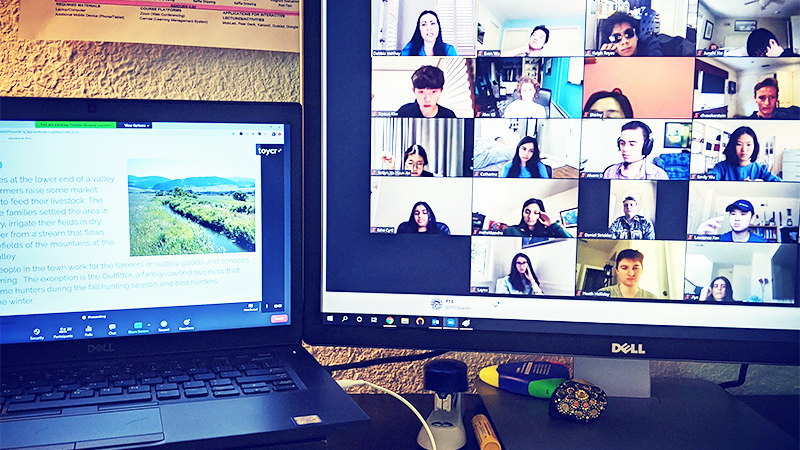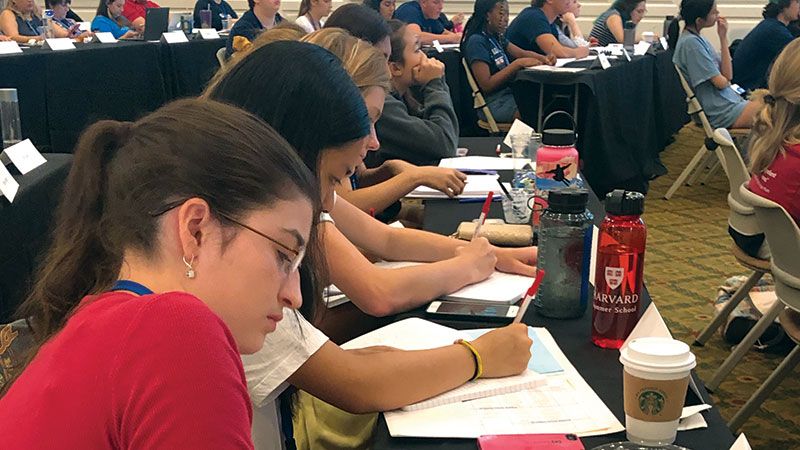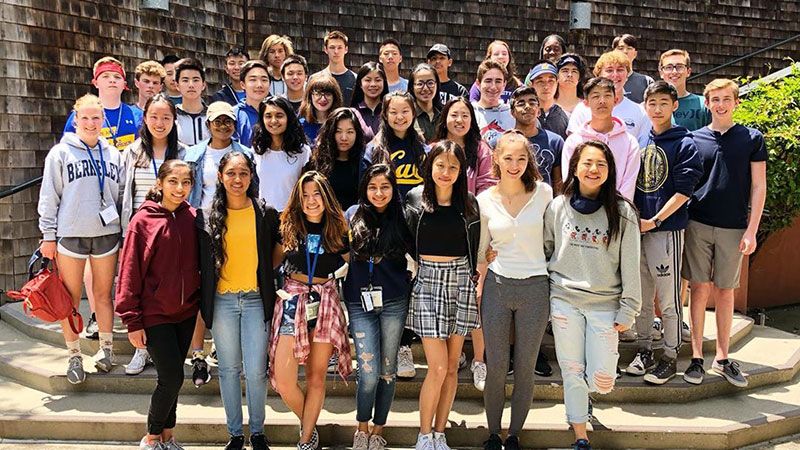

One of the many TFAS programs to switch to a virtual format due to the coronavirus pandemic and facility closures is the “Economics for Leaders,” program organized through the TFAS high school programming division, the Foundation for Teaching Economics (FTE). The first of the 22 online 2020 summer programs began on Monday, June 15, and although the students must meet virtually, they are actively engaging and learning new lessons and skills each week.
Program evaluations from the 186 students who have already completed an Economics for Leaders virtual program showed higher levels of learning and satisfaction when compared with previous in-person offerings. When asked how FTE should improve the virtual classes one student commented, “N/A! The program was very flawless and adapted better than most academic institutions,” and another called the program the “best online class ever!”
Through lectures and interactive games, nearly 620 students from across the U.S. and around the world will explore “the economic way of thinking,” develop leadership skills, gain a better understanding of the world and learn how to integrate economics into the process of everyday decision-making.
They are as engaging, interactive, and fun as the in-person classes. Students are leaving the week with a thorough understanding of the economic way of thinking and the skills to apply it in a wide range of contexts.” – FTE professor Jamie Wagner
INTERACTIVE LEARNING ONLINE

The program activity, “Cartels and Competition” is a student favorite each summer, and the virtual program format is no exception. The simulation allows students to explore the role that profits play as an incentive in markets with limited competition and, ultimately, the impact of competition on market outcomes.
In this activity, students are grouped into six “companies” that control 98% of an industry business worldwide, a condition economists call an oligopoly. Through a series of production rounds, students act as company “executives” to make production decisions while keeping in mind that their profitability is also dependent on the production decisions of their competitors. To incentivize students, a monetary prize is awarded to the company with the highest profit at the end of the activity.
Following a lecture by FTE professor Jamie Wagner on June 24, students began the simulation by being separated by company into breakout rooms on the Zoom web conference platform. While in their breakout rooms, they determined their company names and assigned a captain to submit their “production decisions.” Students also chose an accountant for each company to maintain balance sheets and help determine revenue after each production round.
After the second round of production, captains from each company were invited to attend a “trade conference” in a separate breakout room. During this conference, the captains agreed to restrict production in order to increase their company’s profits. However, during the third round of production, it became apparent that only two of the six companies actually stood by the collusive agreement as the others decided to “cheat” in order to maximize their own profit to win the game.
The “Cartels and Competition” activity demonstrates how profit-motivated collusion by producers almost always breaks down. Even though profit is a powerful motivator to restrict production through collusion, students experience how competition for profit among producers ultimately undermines cartel agreements. More importantly, students learn how competition, even in an oligopoly, regulates the market and protects the consumer. They leave the lesson understanding that in markets, “profit serves as the motivator and competition serves as the regulator.”
Wagner says the virtual programs are going above and beyond and doing far more than making the best of a bad situation.
“They are as engaging, interactive, and fun as the in-person classes,” she said. “Students are leaving the week with a thorough understanding of the economic way of thinking and the skills to apply it in a wide range of contexts.”
POSITIVE REACTIONS TO ONLINE CURRICULIUM

In anonymous evaluations following the program, several students praised the program as a highly impactful and useful method of studying economics. One student shared in program evaluations: “This was beneficial because I got to learn new things about the economy that I had no prior knowledge of, and I was able to make new friends, and learn new ways that I can become a better leader when I go back to school.”
In addition to the new skills and economics lessons, the connections built among the students continues to be a valuable aspect of the program. Another student shared: “Honestly, this program gave me a sense of community that I haven’t had in months, and the economics lessons were engaging and fun!”
Given the difficult public policy choices facing governments and their citizens around the globe because of COVID-19, teaching these skills and knowledge to the next generation of leaders is one of the most important actions we can take now to ensure our future prosperity.
“This really sparked and deepened my interest in economics and learning the inner workings of everything from property rights to labor markets and inflation, among other things,” one student remarked. “Going into this program, I was expecting that it would be five straight hours of un-engaging material, but it was the complete opposite. I am definitely sad that this has ended.”
“Economics for Leaders” programs continue for high school students through August, and each week more young leaders will be exposed to leadership development and economics training that will prepare them for success in the future. To learn more about programs for high school students, please visit FTE.org.

